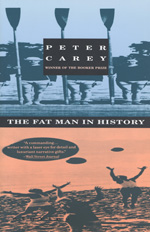
Peter Ackroyd
The Fat Man in History
Sunday Times 19 October 1980
There is something very odd about Australian fiction. In one paragraph the language may be gilded and polished until it resembles a baroque gridiron; and then, in the next, a broad vernacular pushes its way through like punch-drunk boxer.
In the novels of Patrick White and Thomas Keneally, to take two of the more eminent examples, the harshest crudity is mingled with a most elaborate sentiment, the demotic jostles with the sublime. It is a mixture of innocence and calculation, a contemporary version of Jacobean drama in which the simplicities of madness and revenge are expressed within absurdly sophisticated linguistic mannerisms. Peter Carey’s first book establishes him in this paradoxical tradition.
In this collection of ten stories, everything has grown into the wrong shape and, as a result, the world itself is part mysterious, part exotic. Yet Carey writes about it in a level and neutral manner, like an explorer recording in his diary the habits of some peculiar race – the important thing to describe its characteristics for posterity, rather than to register his own alarm or amazement:
The first reports of dematerializing people were not generally believed and were suppressed the media. But these things were soon common knowledge and few families were untouched by them. Such incidents were obviously not all the same but in many victims there was a tendency to exhibit extreme aggression towards those around them.
Carey’s characters inhabit a timeless and featureless zone; their customs, although they make sense to themselves are often bizarre. In the tile story, set in some unspecified future, to be obese is considered counter-revolutionary: five fat men brood over this fact in a dilapidated house, until of them is killed and eaten. In other fables, human beings are able to adopt new bodies through a lottery, established by a galactic race whom we never see but whose high-pitched giggle we often hear; an efficiency expert turns into a psychopathic murderer; dreams of America have fatal results.
A world filled with such strange and fetid shapes can only be convincingly maintained over a short space: ordinary expectations of plot and human drama would shatter the mood which Carey has evoked, and he has wisely avoided the temptation to write a novel in this idiom. But here is a great deal of ingenuity in both the construction and the elaboration of these short narratives; and although much of their material is apparently derived from simple fantasy, there is a tenderness in Carey’s writing which takes it beyond the transparent sphere of whimsy. Each story ends on a melancholy but powerful note, like the sudden discharge of electrical energy which illuminates all that it touches.
The tenderness comes I suspect from the fact that his stories characteristically concern the odd and the unsynchronized, outsiders baffled and ill at ease in the world which surrounds them, but always ready to defy it. They stand perplexed in the middle of their fate, while it is always daylight outside, always still, always the same. It is as if Peter Carey had taken the Australian terrain and extended it into an imaginary landscape, a landscape of the colonized but inventive mind. As a result he gets into his characters’ heads with a rare fidelity and sympathy – but strangely, he enters the reader’s head also. This is an impressive band entertaining book.
Peter Ackroyd has written many, many novels, histories bioghraphies.
